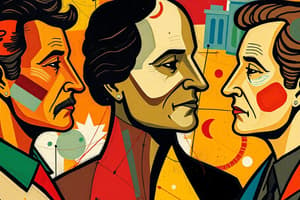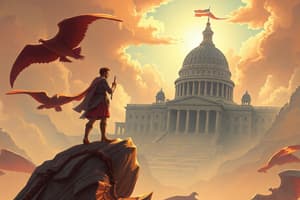Podcast
Questions and Answers
लोकतंत्र की पहचान क्या है?
लोकतंत्र की पहचान क्या है?
- नागरिकों द्वारा सीधे कानूनों पर मतदान।
- केंद्रित शक्ति द्वारा शासन करना।
- राज्य के भीतर अपनी शक्ति के लिए संघर्ष।
- सरकार का चुनाव जनता द्वारा किया जाता है। (correct)
किस प्रणाली को ऑटोक्रसी के रूप में जाना जाता है?
किस प्रणाली को ऑटोक्रसी के रूप में जाना जाता है?
- जो केवल एक राजनीतिक दल की शासन करता है।
- जहां लोग सीधे मतदान करते हैं।
- जहां सत्ता एक व्यक्ति या समूह के पास होती है। (correct)
- की व्यवस्था जिसमें कोई प्रतिनिधि नहीं होता।
नीति चक्र में कौन सा चरण सबसे पहले आता है?
नीति चक्र में कौन सा चरण सबसे पहले आता है?
- नीति मूल्यांकन।
- नीति अपनाना।
- एजेंडा सेटिंग। (correct)
- नीति निर्माण।
कौन सा राजनीतिक सिद्धांत सहयोग और अंतरराष्ट्रीय संस्थानों पर जोर देता है?
कौन सा राजनीतिक सिद्धांत सहयोग और अंतरराष्ट्रीय संस्थानों पर जोर देता है?
किस प्रकार के सरकारी प्रणाली में शक्ति एक छोटे समूह के पास होती है?
किस प्रकार के सरकारी प्रणाली में शक्ति एक छोटे समूह के पास होती है?
प्राथमिकता के अनुसार सीटों का आवंटन किस प्रणाली में किया जाता है?
प्राथमिकता के अनुसार सीटों का आवंटन किस प्रणाली में किया जाता है?
किस राजनीतिक सिद्धांत में सामाजिक स्वामित्व का समर्थन किया जाता है?
किस राजनीतिक सिद्धांत में सामाजिक स्वामित्व का समर्थन किया जाता है?
कौन सा न्यायपालिका का कार्य है?
कौन सा न्यायपालिका का कार्य है?
Flashcards are hidden until you start studying
Study Notes
Overview of Political Science
- Definition: The study of politics, government systems, and political behavior.
- Branches:
- Comparative politics
- International relations
- Political theory
- Public administration
- Public policy
Key Concepts
- Power: The ability to influence or control the behavior of people and institutions.
- Authority: Legitimate power recognized by society.
- Legitimacy: Acceptance of authority; a government is considered legitimate if its authority is recognized.
- Sovereignty: The authority of a state to govern itself without external interference.
Political Systems
- Democracy: System where government is elected by the populace.
- Direct democracy: Citizens vote on laws directly.
- Representative democracy: Citizens elect representatives to make decisions.
- Autocracy: System ruled by a single individual or group with concentrated power.
- Oligarchy: Power rests with a small number of people.
- Totalitarianism: An extreme form of autocracy where the state seeks to control all aspects of public and private life.
Political Ideologies
- Liberalism: Emphasizes individual rights, democracy, and free-market economy.
- Conservatism: Values traditional institutions and gradual change.
- Socialism: Advocates for social ownership and democratic control of the means of production.
- Communism: A classless system where all property is publicly owned.
Political Institutions
- Legislature: Body responsible for making laws (e.g., Congress, Parliament).
- Executive: Branch responsible for enforcing laws (e.g., President, Prime Minister).
- Judiciary: System of courts that interprets laws and administers justice.
Electoral Systems
- First-past-the-post: Winner is the candidate with the most votes.
- Proportional representation: Seats are allocated based on the percentage of votes received.
- Mixed systems: Combination of both plurality and proportional systems.
International Relations
- Realism: Focus on power and national interests.
- Liberalism: Emphasizes cooperation and international institutions.
- Constructivism: Highlights the role of ideas, beliefs, and identity in international relations.
Public Policy
- Policy Cycle:
- Agenda setting
- Policy formulation
- Policy adoption
- Policy implementation
- Policy evaluation
Research Methods
- Qualitative methods: Case studies, interviews, content analysis.
- Quantitative methods: Surveys, statistical analysis, experiments.
Important Theorists
- Niccolò Machiavelli: Political realism and the nature of power.
- John Locke: Ideas of natural rights and government by consent.
- Karl Marx: Critique of capitalism and class struggle.
- Max Weber: Bureaucracy and authority types (traditional, charismatic, legal-rational).
Current Trends
- Globalization: Increasing interdependence among countries.
- Populism: Political approach that contrasts "the people" against "the elite."
- Environmental Politics: Growing focus on sustainability and climate policies.
राजनीति विज्ञान का अवलोकन
- राजनीति, सरकारी प्रणालियाँ और राजनीतिक व्यवहार का अध्ययन।
- मुख्य शाखाएँ:
- तुलनात्मक राजनीति
- अंतरराष्ट्रीय संबंध
- राजनीतिक सिद्धांत
- सार्वजनिक प्रशासन
- सार्वजनिक नीति
प्रमुख अवधारणाएँ
- शक्ति: लोगों और संस्थाओं के व्यवहार को प्रभावित करने या नियंत्रण की क्षमता।
- प्राधिकार: समाज द्वारा मान्यता प्राप्त वैध शक्ति।
- वैधता: प्राधिकार की स्वीकृति; सरकार को वैध माना जाता है अगर उसकी प्राधिकार को स्वीकार किया गया हो।
- संप्रभुता: एक राज्य की स्वयं को बिना बाहरी हस्तक्षेप के शासन करने की शक्ति।
राजनीतिक प्रणाली
- लोकतंत्र: प्रणाली जहाँ सरकार जनता द्वारा चुनी जाती है।
- प्रत्यक्ष लोकतंत्र: नागरिक सीधे कानूनों पर मतदान करते हैं।
- प्रतिनिधि लोकतंत्र: नागरिक प्रतिनिधियों का चुनाव करते हैं जो निर्णय लेते हैं।
- एकतंत्र: प्रणाली जो एक व्यक्ति या समूह द्वारा संचालित होती है, जिनके पास केंद्रीय शक्ति होती है।
- ओलिगार्की: सत्ता एक छोटे समूह के हाथों में होती है।
- पूर्णतंत्रवाद: एक अत्यंत रूप का एकतंत्र जहाँ राज्य सार्वजनिक और निजी जीवन के सभी पहलुओं को नियंत्रित करता है।
राजनीतिक विचारधाराएँ
- उदारवाद: व्यक्तिगत अधिकारों, लोकतंत्र और मुक्त बाजार अर्थव्यवस्था पर जोर।
- संحोधनवाद: पारंपरिक संस्थानों और धीरे-धीरे बदलाव के मूल्य।
- समाजवाद: उत्पादन के साधनों के सामाजिक स्वामित्व और लोकतांत्रिक नियंत्रण का समर्थन।
- कम्युनिज़्म: एक वर्गविहीन प्रणाली जहाँ सभी संपत्ति सार्वजनिक होती है।
राजनीतिक संस्थाएँ
- विधानसभा: कानून बनाने वाला निकाय (जैसे, कांग्रेस, संसद)।
- कार्यपालिका: कानूनों को लागू करने वाला भाग (जैसे, राष्ट्रपति, प्रधानमंत्री)।
- न्यायपालिका: अदालतों का प्रणाली जो कानूनों की व्याख्या करती है और न्याय प्रदान करती है।
चुनावी प्रणाली
- पहली पास की पोस्ट: विजेता वह उम्मीदवार होता है जिसे सबसे अधिक वोट मिलते हैं।
- प्रतिशत प्रतिनिधित्व: सीटें प्राप्त वोटों के प्रतिशत के अनुसार आवंटित की जाती हैं।
- मिश्रित प्रणालियाँ: बहुलता और प्रतिशत प्रणालियों का संयोजन।
अंतरराष्ट्रीय संबंध
- यथार्थवाद: शक्ति और राष्ट्रीय हितों पर ध्यान केंद्रित करता है।
- उदारवाद: सहयोग और अंतरराष्ट्रीय संस्थाओं पर जोर देता है।
- निर्माणवाद: अंतरराष्ट्रीय संबंधों में विचारों, विश्वासों और पहचान की भूमिका को उजागर करता है।
सार्वजनिक नीति
- नीति चक्र:
- एजेंडा सेटिंग
- नीति निर्माण
- नीति अपनाना
- नीति कार्यान्वयन
- नीति मान्यता
शोध विधियाँ
- गुणात्मक विधियाँ: केस स्टडीज, साक्षात्कार, सामग्री विश्लेषण।
- मात्रात्मक विधियाँ: सर्वेक्षण, सांख्यिकीय विश्लेषण, प्रयोग।
महत्वपूर्ण सिद्धांतकार
- निकोलो मैकियावेली: राजनीतिक यथार्थवाद और शक्ति की प्रकृति।
- जॉन लॉक: प्राकृतिक अधिकारों और सहमति द्वारा सरकार के विचार।
- कार्ल मार्क्स: पूंजीवाद की आलोचना और वर्ग संघर्ष।
- मैक्स वेबर: नौकरशाही और प्राधिकार के प्रकार (पारंपरिक, करिश्माई, कानूनी-राशि)।
वर्तमान प्रवृत्तियाँ
- वैश्वीकरण: देशों के बीच बढ़ती परस्पर निर्भरता।
- जनता केंद्रित राजनीति: राजनीतिक दृष्टिकोण जो "लोगों" को "अभिजात वर्ग" के खिलाफ रखता है।
- पर्यावरण राजनीति: स्थिरता और जलवायु नीतियों पर बढ़ती फोकस।
Studying That Suits You
Use AI to generate personalized quizzes and flashcards to suit your learning preferences.




